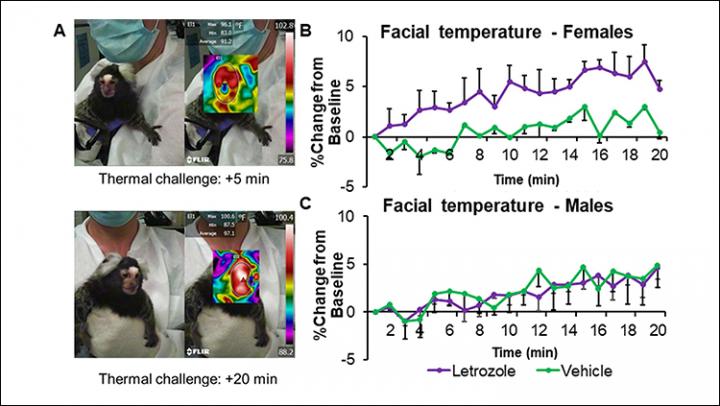Findings emphasize need for further investigation of breast cancer treatments and their effects on the brain

Credit: Gervais et al., JNeurosci (2018)
A comprehensive study of monkeys given the breast cancer drug letrozole reveals side effects that impact the brain. Published in JNeurosci, the research establishes the common marmoset as an important nonhuman primate model for studying the effects of estrogen-reducing treatments on the nervous system.
Letrozole is used to prevent breast cancer recurrence by interfering with the production of estrogens. Although side effects such as mood disturbances and memory issues have been reported in both humans and animals, little is known about how the drug impacts the brain.
Nicole Gervais and colleagues administered Letrozole to male and female marmosets via pudding for four weeks and observed many of the same behavioral changes, including hot flashes and increased anxiety, experienced by women receiving similar treatment. Letrozole also compromised the function of neurons in the hippocampus and impaired spatial memory. Together these findings emphasize the need for further investigation of breast cancer treatments and their effects on the brain.
###
Article: Adverse effects of aromatase inhibition on the brain and behavior in a nonhuman primate
DOI: http://www.
Corresponding author: Nicole Gervais (University of Toronto, Canada) [email protected]
About JNeurosci
JNeurosci, the Society for Neuroscience’s first journal, was launched in 1981 as a means to communicate the findings of the highest quality neuroscience research to the growing field. Today, the journal remains committed to publishing cutting-edge neuroscience that will have an immediate and lasting scientific impact, while responding to authors’ changing publishing needs, representing breadth of the field and diversity in authorship.
About The Society for Neuroscience
The Society for Neuroscience is the world’s largest organization of scientists and physicians devoted to understanding the brain and nervous system. The nonprofit organization, founded in 1969, now has nearly 37,000 members in more than 90 countries and over 130 chapters worldwide.
Media Contact
David Barnstone
[email protected]
202-962-4000
Related Journal Article
http://dx.




